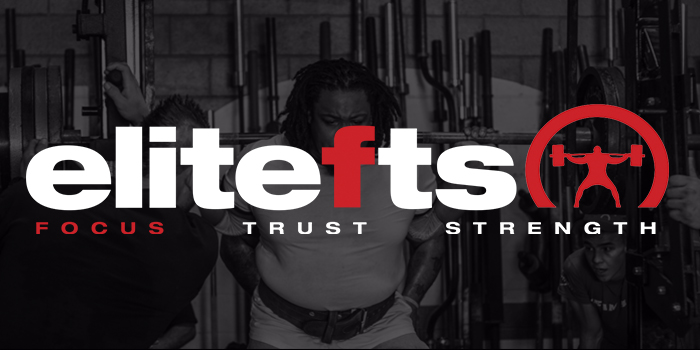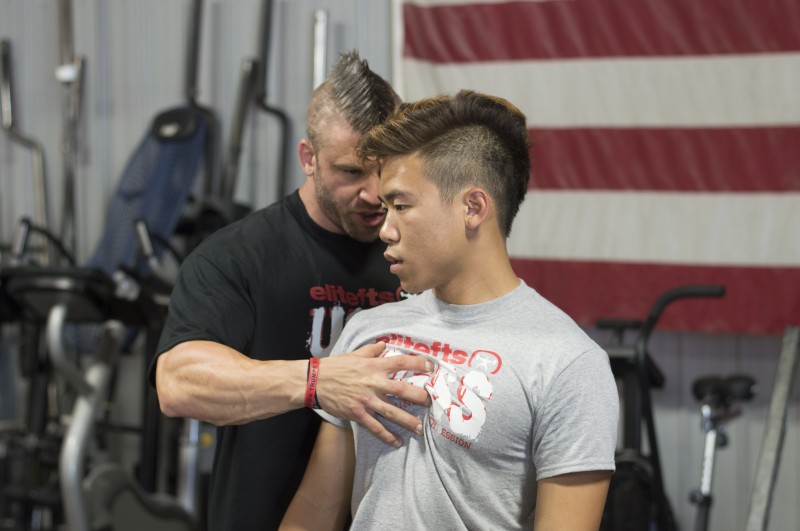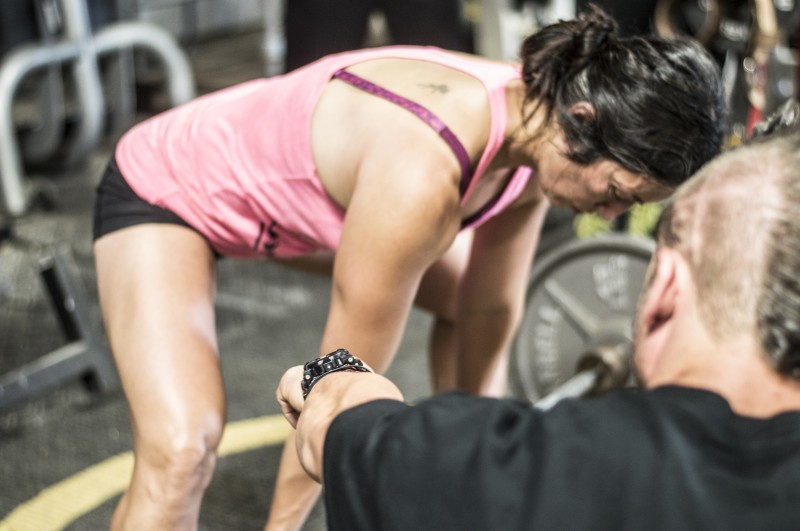
Originally published in September of 2016
This article explains five of the most common reasons that powerlifters fail to reach their full potential. Fix these issues and you'll be on your way to getting stronger.
1. Your technique is inefficient.
Without question, the number one reason most lifters don’t lift the weights that they are able to is lack of technique.
“My own position is so far on the obsessive side of preparation and professionalism that I fear my point of view is not going to be shared by anyone.” – Jonny Wilkinson (Professional Rugby Player).
One of the most popular programs for powerlifting is Jim Wendler’s 5/3/1, the main program of which offers around 10-15 reps per week above 70% of 1 RM. You can also add in Boring But Big, which adds in another 50 reps per week at 50% of 1RM. Unless the lifter actively looks to put this in, they will not get a lot of time to practice their trade.
WATCH: Dave's Squat Tips for NBS Lifters
In juxtaposition, one of Boris Shieko’s routines taken from his website using program number 37, week 1 calls for 74 squats done with an average intensity of 66% RM. This is the lowest number of lifts for squat in the training program; on week 3 it climbs up to 109 lifts at an average intensity of 68%. What separates this sort of specific powerlifting routine away from a generic strength program such as 5x5 or 5/3/1 is that thought and intention has gone into the selection of every set and rep delving into the small detail on each of the three lifts.
This detail is what separates a great program from a template. For most lifters, they also lack any attention to detail when it comes to their execution of the lifts. You should be trying to become a powerlifting cyborg who completes the same sequence of movements every time you step up to squat, bench or deadlift.
To become more efficient, you need to actively seek feedback and improvement in your lifting technique and search for a program or hire a coach to devise a program that will aid you in this process.
2. You are outcome-focused and not embedded in the process.
Powerlifting is a sport which can lead to people waddling about in multi-ply suits and walking about like zombies in bench shirts because they can lift some more weight. Most lifters want to lift heavier things. However, most fail to do so because they are too fixated on how to get good results quickly or how to get short, sharp increases.
These lifters almost invariably end up sidelined from being injured constantly or from lifting too heavy, too often and blunting their progress by being either chronically overreached or under-stimulated from a lack of volume in their training.
The lifters who get caught up in the love of training, who figure out it is about how the weight is lifted and doing so with a cyclical amount of meaningful volume — these are the lifters who go on to be something. It’s not about being the quickest to squat two plates; it’s about being in the game long enough with a good enough training history to squat five, then six, and eventually seven plates.
3. You are focused on micro-managing the 80% and not bolting down the 20%.
Pretty much everyone is aware of the 80/20 principle popularized by the book of the same name written by Richard Koch. If you are not aware of the principle, Richard’s book is excellent and I would highly recommend you read it. However, the basic idea is that 80% of the positive results that you get comes from 20% of your effort.
A lot of powerlifters and trainers in general really get lost and start to worry about silly bits of fluff like single-leg training, hip thrusters, or what percentage of carbohydrate you eat on a day-to-day basis. I think it wouldn’t be far off the mark to suggest that the majority of lifters spend more time thinking about these factors than they do about how they are programming for squat, bench, and deadlift. If you stop to think about this then you will realize that this is almost the definition of madness.
The number one most important principle in sports training is specificity of training. Without question, this is how you get to the most effective 20% of your effort. If you’re an equipped lifter, your raw numbers aren’t really that important, as how you move in equipment makes no difference to how you move in kit.
If you get stronger in kit, you are going to get stronger out of kit. If you get stronger out of kit, you are going to get stronger in kit. However, you are increasing the lag time of realizing your increase in strength. This happens because your increase in strength or fitness is non-specific and the lag time is created by the time it takes to realize or transfer your general increase in fitness. The best way to avoid this lag is to train the way you want to compete.
If you’re a powerlifter, spend 80% of your time training and thinking about how you train for the big three and you will be a much better lifter for it.
4. You spend too much time online.
People online are trying to make money or to sell you on their idea or gadgets. Shocking, I know. The vast majority of people you read from are going to, 1) be biased to their own thoughts or ways of training, but more importantly, 2) will be deliberately engineering their content to make their ways of training or products seem like exactly what you need to succeed. This is a "complicate to profit" mentality.
If you want to be the best powerlifter you can possibly be, you’re going to need these four things in your life:
- Access to a barbell, bench, squat rack, and weights.
- Access to food.
- Access to a bed.
- Access to a coach.
Everything else being offered to you is nice to have but not a necessity. All of the greatest lifters of all time had access to these key needs. Bill Kazmaier totaled 1100 kilograms in IPF conditions using shitty wraps and a marathon suit without access to creatine, slingshots, $200 belts, or an online coach. He utilized these core needs to become arguably the best strength athlete of all time. He certainly didn’t spend four hours a day scrolling through his Facebook feed or arguing about the depth of world record squats on YouTube.
5. You spend too much time thinking and not enough time lifting.
The rise of the hipster seems to have also given rise to the pseudo-intellectual meathead. A lot of guys spend a whole lot of time reading articles, books, and journals all just to come up with cluster-fuck articles or programs that end up in no one making a lick of progress. Without the filter of experience, which can only be garnered from time training or training others, it is almost impossible to filter what can often be the absurd and abstract world of training theory.
RECENT: Beginners and the Accountability Weakness
There are a lot of people out there who can tell you all of the reasons why you can’t get better, but there aren’t a lot of people who can guarantee they will help get you better. It doesn’t matter how strong you are or how long you have been training — if you are still producing testosterone to a level that isn’t declining, you should be able to get stronger. Sure, your progress will slow to a snail’s pace once you have played all of your aces, but there is pretty much zero reason you can’t keep the needle moving, even if it is slowly.
The sort of person or coach who is going to keep that needle going for the majority of their life as a lifter or for your life as a lifter is the coach who has a huge experiential base. Bollocks like isometrics, eccentric training, or isokinetic training can seem like viable methods of training to someone who has little experience of getting strong or getting others strong.
The kind of person who would rather spend 20 hours a week reading and thinking about training rather than 20 hours training are normally the small, weak guys in the gym/club who spend more on physiotherapy in a month than they do on food.
Never forget that lifting is a verb and verbs are action words.
Marc Keys is a professional strength and conditioning coach for Edinburgh Rugby. Prior to working in professional sport, Marc worked for the Scotland Institute of Sport where he was involved in the physical preparation of around 60 Olympic and commonwealth athletes from over 20 different of sport, many of whom went to medal for Team Scotland or Great Britain. As a powerlifter, Marc has been lifting in the IPF for eight years. He has competition best raw lifts of 620-pound squat, 455-pound bench press, and 660-pound deadlift at a bodyweight of 248 pounds. Marc is involved with the training of nearly 100 strength athletes through his online coaching service (onlinestrengthcoach.com) and his barbell club (Edinburgh barbell). If you would like to contact Marc please email speedpowerperformance@gmail.com.












http://christianbosse.com/article-recommendations-week-38-2016/
Keep up the great work!